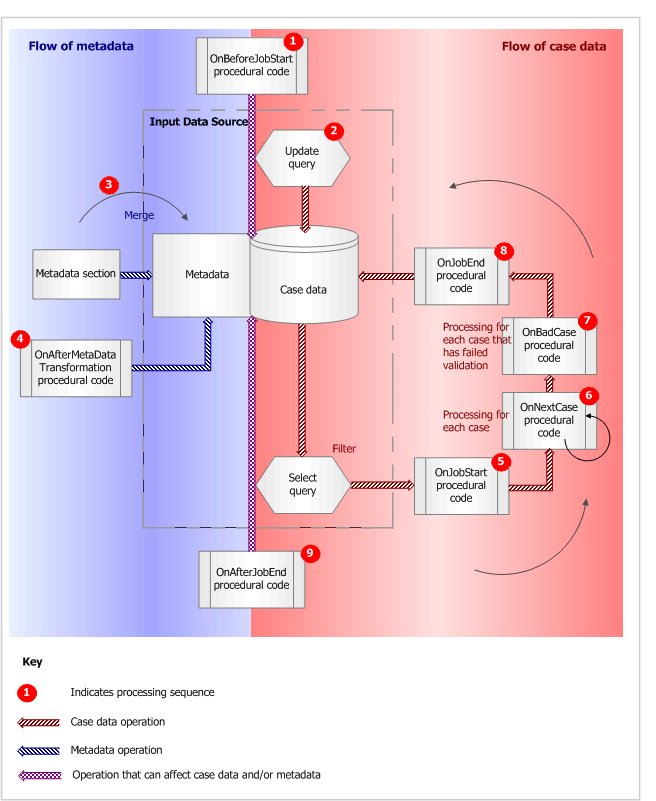DMS file flow when you use the UseInputAsOutput option
The following diagram shows what happens when you run a DMS file using the UseInputAsOutput option. Use this option with caution, because it updates the input data source irreversibly.
You can specify the UseInputAsOutput option in one of the InputDataSource sections, in which case you do not need an OutputDataSource section in your DMS script. If you are using the UNICOM Intelligence Data Model to read the case data, you can specify the UseInputAsOutput option only if the CDSC for that data source supports the updating of existing records. You must also set the MR Init MDM Access connection property to 1 in the InputDataSource section to open the data source for read/write access or when operating in validation mode.
The diagram shows the sequence in which the various parts of the file are executed. However, some parts of the file are optional. For example, the update query is optional as are the OnBeforeJobStart, OnAfterMetaDataTransformation, OnJobStart, OnNextCase, OnBadCase, OnJobEnd, and OnAfterJobEnd Event sections.
2 The Update Query defined in the InputDataSource section can be used to add, update, or delete case data in the input data source and is typically used to remove unwanted test data. See
InputDataSource section.
3 The metadata specified in the Metadata section is merged with the metadata specified in the connection string in the InputDataSource section. The merged metadata is then made available to the input data source so that any new variables (from the Metadata section) that have been included in the Select Query statement will be returned by the query. See also
Metadata section.
5 The OnJobStart Event Section is run before the processing of the individual cases and is typically used to set up global variables that are required in the OnNextCase and OnBadCase sections. See also
OnJobStart Event section.
6 The OnNextCase Event section is processed for each
case included in the transfer and is typically used to clean the case data. See also
OnNextCase Event section.
7 The OnBadCase Event section is processed for each case that has failed validation and will not be transferred to the output data source, and is typically used to create a report of bad cases. See also
OnBadCase Event section.
8 The OnJobEnd Event section is run after the processing of the last case has been completed and is typically used to close report files and set up weighting using the Weight component. See also
OnJobEnd Event section.
9 The OnAfterJobEnd Event section is processed after all other processing has finished. This is typically used to set up tables. See also
OnAfterJobEnd Event section.
See also

